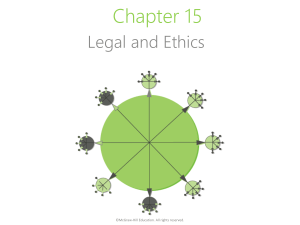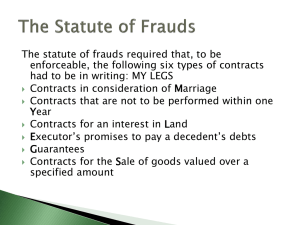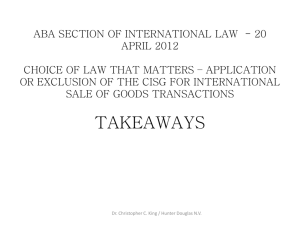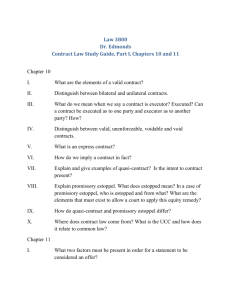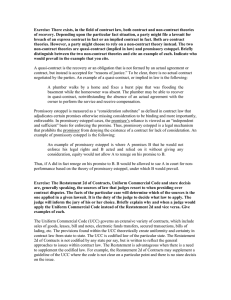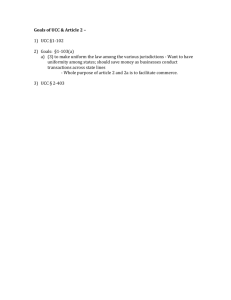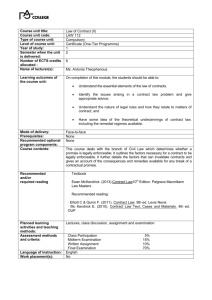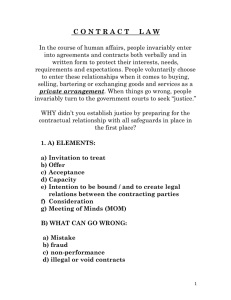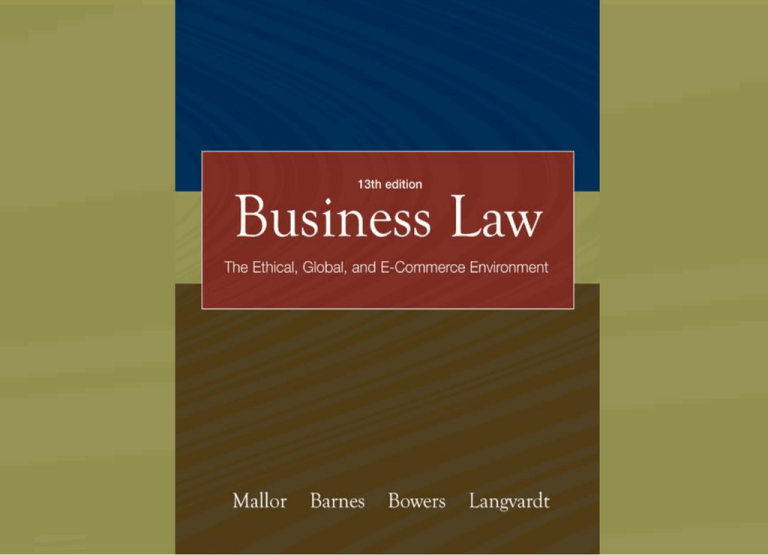
P A R T
3
Contracts
Introduction to Contracts
The Agreement: Offer
The Agreement: Acceptance
Consideration
Reality of Consent
McGraw-Hill/Irwin Business Law, 13/e
© 2007 The McGraw-Hill Companies, Inc. All rights reserved.
P A R T
3
Contracts
Capacity to Contract
Illegality
Writing
Rights of Third Parties
Performance & Remedies
McGraw-Hill/Irwin Business Law, 13/e
© 2007 The McGraw-Hill Companies, Inc. All rights reserved.
C H A P T E R
9
Introduction to Contracts
“Contracts are agreements made
up of big words and little type.”
Sam Ewing, quoted in Saturday
Evening Post, May 1993
Learning Objectives
Nature
of contracts
Basic elements of a contract
Basic contract types
Non-contract obligations
9-5
Contracts
Not every promise is legally enforceable
When a set of promises has the status of
contract, a person injured by a breach of that
contract is entitled to call on the government
(courts) to force the breaching party to honor
the contract
Contract law is ancient law, but has evolved
to reflect social change
9-6
Elements of a Contract
(1) agreement (2) between competent parties
(3) based on genuine assent of the parties
that is (4) supported by consideration, (5)
made for a lawful purpose, and (6) in the
form required by law, if any
See Figure 1, page 276
9-7
Contract Concepts and Types
Bilateral contracts: two parties make promises
to one another
Unilateral contracts: one party makes promise
Valid contract: enforceable agreement
Voidable contract: agreement otherwise
binding, but circumstances allow one party
to avoid binding nature or enforcement
Void contract: agreement prohibited by law
9-8
Contract Concepts and Types
Express contract: agreement of parties
manifested by written or oral words
Implied contract: agreement not shown by
words, but by acts and conduct of parties
Difference between express & implied
contracts relates to manner of proving the
existence of the contract, not the effect; one
or the other arises
9-9
Sources of Governing Law
Two bodies of law govern contracts: Article
2 of Uniform Commercial Code (UCC) and
the common law of contracts
UCC is statutory law in every state
9 - 10
Contains nine articles
Article 2 expressly applies to contracts for the
sale of goods [2–102] (numbers in brackets
refer to specific Code sections)
The UCC and Hybrid Contracts
9 - 11
Many contracts involve goods and services
International Contract Law
United Nations Convention on Contracts for
the International Sale of Goods (CISG) is a
body of contract rules that harmonizes
contract principles from many legal systems
CISG automatically applies to a contract for
sale of goods between commercial parties
from signatory nations to CISG unless the
parties expressly opt out of CISG by contract
9 - 12
Non-Contract Obligations
Courts may enforce an obligation to pay for
certain losses or benefits even in absence of
mutual agreement and exchange of value
Quasi-contract is an obligation imposed by
law to prevent unjust enrichment of one
party in certain circumstances
9 - 13
Plaintiff recovers reasonable value of benefit
conferred on defendant (reasonable price) or
value of labor (quantum meruit)
Non-Contract Obligations
A court may apply doctrine of promissory
estoppel when one party relies upon another
party’s promise to his or her detriment
(detrimental reliance), but there’s no contract
Court will force promisor to fulfill
promise or pay compensation
9 - 14
Review
9- 15
Test Your Knowledge
True=A, False = B
Every promise is legally enforceable
The main element of a contract is fairness
In a bilateral contract, two parties make
promises to one another
The UCC is statutory law in every state
The UCC applies to the sale of goods and
services
9 - 16
Test Your Knowledge
Multiple Choice
A void contract refers to an agreement that is:
(a) binding and enforceable agreement
(b) otherwise binding, but due to circumstances
surrounding execution or lack of capacity, may be
rejected at option of one party
(c) without legal effect because prohibited by law
A non-contract obligation does not include:
(a) Quasi-contract theory
(b) Promissory estoppel
(c) The CISG doctrine
(d) Quantum meruit
9 - 17
Though Question
What contracts have you entered into
recently?
9 - 18

